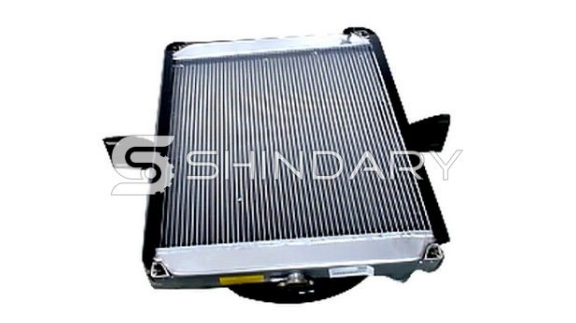The truck radiator is a vital component of the engine cooling system, ensuring that the engine operates at the right temperature for optimal performance and longevity. As a truck owner or operator, understanding the lifespan of a radiator is essential for proper maintenance and avoiding unexpected breakdowns. In this article, we will explore the factors that influence the lifespan of a truck radiator and offer insights into extending its durability.
The Role of a Truck Radiator:
The radiator plays a critical role in maintaining the engine's temperature within a safe and efficient range. It dissipates excess heat generated during combustion by circulating coolant through the engine and the radiator. Proper cooling prevents overheating, which can lead to engine damage and costly repairs.

Spare parts for Truck radiator
Factors Influencing the Lifespan of a Truck Radiator:
1. Quality of Components:
The quality of the radiator and its components significantly impacts its lifespan. Radiators made from durable materials and equipped with high-quality cores and tanks tend to have longer lifespans.
2. Maintenance:
Regular maintenance, including coolant flushes and inspections, can extend the radiator's lifespan. Neglecting maintenance can lead to corrosion, clogs, and reduced efficiency.
3. Coolant Quality:
Using the right type of coolant and maintaining the proper coolant-to-water ratio is essential. Improper coolant mixtures or low-quality coolant can lead to corrosion and reduced radiator efficiency.
4. Driving Conditions:
Operating a truck in extreme temperatures, whether extremely hot or cold, can accelerate wear and tear on the radiator. Trucks used for towing, heavy hauling, or frequent stop-and-go driving may also experience higher stress on the radiator.
5. Coolant Contaminants:
Contaminants, such as rust, debris, and particles, can accumulate in the radiator over time, leading to clogs and reduced cooling efficiency.
6. Corrosion:
Corrosion can occur due to the presence of electrolytes in the coolant. Over time, corrosion can lead to leaks and reduced radiator effectiveness.
7. Vibration and Shock:
Trucks frequently encounter vibrations and shocks due to uneven terrain or rough roads. These vibrations can impact the radiator's structural integrity.
See also:Automobiles & MotorcyclesAverage Lifespan of a Truck Radiator:
What are Heavy Duty Compression Springs?Top 6 Reasons for Uneven Brake Pad WearIs a Rear Main Seal Leak a Major Issue?Lists of best oil stop leak additivesWhy is Cap & Seal Co the best choice for business purchases?The Ultimate Guide to Oil Seal NBR Material: Everything You Need to Know
The lifespan of a truck radiator can vary widely depending on the factors mentioned above. On average, a well-maintained truck radiator can last anywhere from 8 to 15 years. However, certain conditions can significantly shorten this lifespan, while proper care can extend it beyond the average range.
Extending the Lifespan of Your Truck Radiator:
1. Regular Maintenance: Follow the manufacturer's recommended maintenance schedule for coolant flushes and radiator inspections. Regular maintenance prevents corrosion and clogs, ensuring optimal radiator performance.
2. Use High-Quality Coolant: Choose a high-quality coolant that is compatible with your truck's radiator. Using the correct coolant mixture can prevent corrosion and ensure efficient heat transfer.
3. Monitor Coolant Levels: Regularly check your truck's coolant levels and top them off as needed. Low coolant levels can lead to overheating and radiator damage.
4. Inspect for Leaks: Keep an eye out for signs of coolant leaks, such as puddles under the truck or visible coolant stains. Addressing leaks promptly prevents further damage.
5. Avoid Overloading: Avoid overloading your truck, as excess weight can strain the radiator and other components of the cooling system.
6. Protect Against Corrosion: Use antifreeze or coolant additives that provide corrosion protection. These additives can extend the life of the radiator and prevent internal damage.
7. Protect from Debris: Install a grille guard or bug deflector to protect the radiator from debris and insects that can obstruct airflow and cause damage.
Conclusion:
The lifespan of a truck radiator depends on various factors, including maintenance practices, driving conditions, and component quality. With proper care, a well-maintained radiator assembly can last between 8 to 15 years, ensuring efficient engine cooling and preventing costly repairs. Regular maintenance, high-quality coolant, monitoring for leaks, and protecting against contaminants are essential steps to extend the radiator's lifespan and maintain optimal engine performance. By understanding the factors that influence radiator longevity and taking proactive measures, truck owners can ensure reliable cooling and enjoy trouble-free driving.
If you want to know more information about truck radiator, please contact us. We will provide professional answers.
Related articles:Everything You Need to Know About NBR TC Rubber Oil SealsAre Cassette Seals Making a Comeback?Which high-quality oil seals are worth purchasing?Discover the Significance of Chr 47691 in Genetic ResearchUltimate Guide to Customized Green TC Rubber Oil SealsRevolutionary Camshaft Oil: Enhancing Engine Performance?Tree Seal: What It Is, How It Works, and Why You Need It





Comments
0Related Articles
By Janey
94
0
0
By Hou
85
0
0
By Liang
83
0
0
By Evelyn y
84
0
0
By Ingrid
92
0
0
By Justin
104
0
0
By May
90
0
0
By Polly
85
0
0